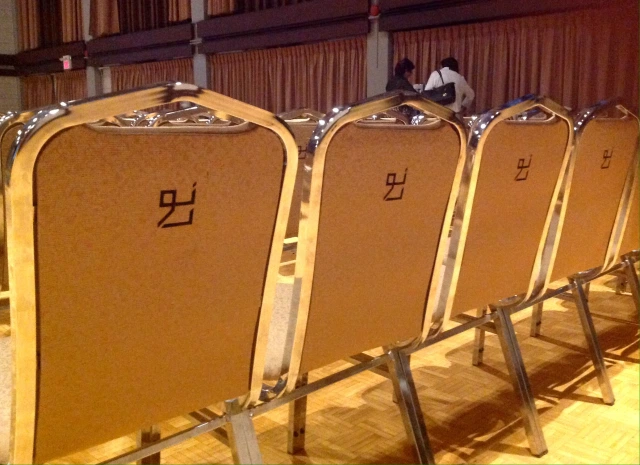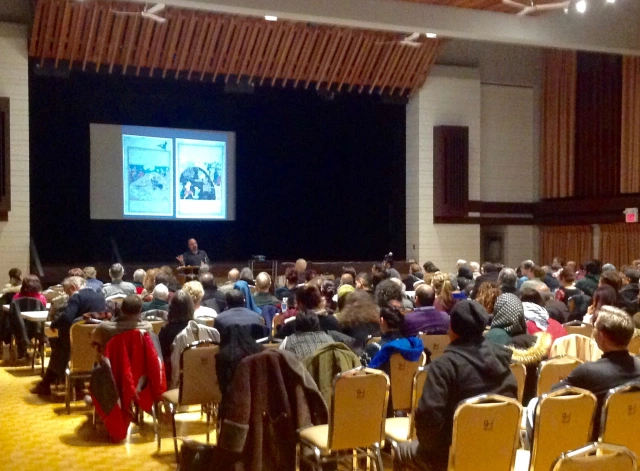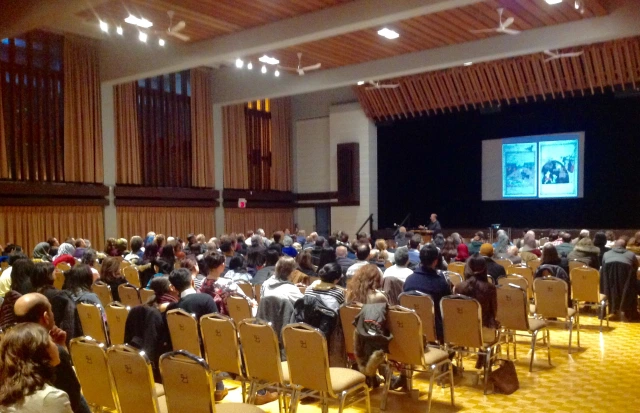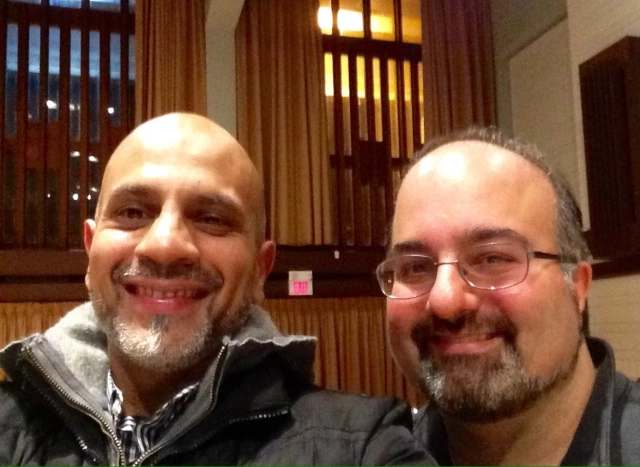
In a peace starved world where there is so much pain, suffering, violence, hurt and loss of life, to attend a lecture about love, in this case, ‘Divine Love’ according to the famous poet Rumi, was something very interesting to be looking forward to.
The event was organised by the Noor Cultural Centre, Toronto. (unfortunately, my wife could not attend but we are hoping to attend an Interfaith event next weekend with the girls to celebrate ‘World Interfaith Harmony Week’). They invited an esteemed speaker, Professor Omid Safi focusing on something entitled ‘Radical love’. This was only his second time in Toronto, so it was a privilege to be in his company. The mission of Noor Cultural Centre is:
Our goal is to become a leading centre for Islamic learning and the celebration of Islamic culture, while respecting the diversity in peoples and religions as directed by the Qur’an [49.13], and in pursuance of that goal: to promote the sharing of knowledge and wisdom in a spirit of humility and respect; to foster an appreciation of the diversity and beauty of the cultural heritages in the world of Islam; to provide a place for the community where mind and spirit can find peace and spiritual fulfillment; and to encourage understanding and amity between peoples by these means.
This was the first time that I had entered a Centre with the same name as my wife. ‘Noor’ (or ‘Nour’ as it can be spelt) is an Arabic word meaning light or radiance. It was this word that was inscribed on the door handles as you enter the centre and on the back of chairs in the auditorium, as if symbolising, enter into the light and radiance of God, come in and be educated, come and be inspired, learn and go and share with others. The verse referred to in their mission is:
O Humankind! Behold, We have created you out of male and female, and have made you into nations and tribes, so that you might come to know one another. Verily, the noblest of you in the sight of God is the one who is most deeply conscious of God. Behold, God is all-knowing, all-aware (Qur’an 49:13)

As I entered, I was welcomed and my heart was embraced by beautiful classical Persian music which created a tranquil ambiance and mellow mood on a night where love can be celebrated in this peace starved time. The speaker began by stating that the world we live in today, is in ‘urgent and immediate need of compassionate action’.

As stated, the focus of the talk was about a person who was a Muslim poet, and who some refer to as a saint: Mawlana Jalal al-Din Balkhi (Rumi) (1207-1273). I remember reading somewhere that he is the most bought and read poet in the US which is an interesting fact.

What is love? (I know some of you are now humming or singing the famous song now). According to Rumi, it is nothing less than an eruption of love upon this being (the human being). It is a cosmic channel of outpouring of this connection between God and His creation.

Professor Safi asked a question to the audience which was thought-provoking and caused some personal introspection. ‘How deep do our roots go and how wide is our circle of compassion?’. If love cannot be contained, how wide is our circle of concern in the world we live in and with the life we lead?

Love is so powerful, that it can propel you forward beyond your own existence. However, what is your existence? Where does our love begin and end? If it stops at our own existence, then this is egotistical and selfish. Does it go a little bit further to our family, our local community, our nation, our race, our sect, our religion? Where does our love begin and where does it end? If love can overflow beyond these confines, then this is when love can become truly divine, it can become beyond this temporal, earthly love.

Professor Safi advised the audience to think of our hearts as a guest house and our emotions as guests. We should treat our emotions with hospitality, be gentle, keep calm, act softly. Welcome anger like an old friend who has visited many times before, be gentle but make it clear it is not here to stay, after a brief visit it can be on its way. When joy comes to visit, it can be one of our favourite guests, which could stay longer, but realise that some level of suffering and pain must take place and therefore joy cannot stay at the guest house forever. You can apply this analogy to any emotions that you experience, especially the negative ones.

There is a beautiful poem by Rumi about the reed flute (hey). It is used as a metaphor for the human condition – the reed has a hauntingly beautiful sound, slow and mournful, it begins with a sense of nostalgia and separation. Professor Safi said that the reason why Rumi starts here is because the Prophet Muhammad said, ‘speak to the people in accordance with their intellect’. In other words, connect with people at their level. Below is the poem translated by Coleman Barks:
Listen to the story told by the reed,
of being separated.“Since I was cut from the reedbed,
I have made this crying sound.Anyone apart from someone he loves
understands what I say.Anyone pulled from a source
longs to go back.At any gathering I am there,
mingling in the laughing and grieving,a friend to each, but few
will hear the secrets hiddenwithin the notes. No ears for that.
Body flowing out of spirit,spirit up from body: no concealing
that mixing. But it’s not given usto see the soul. The reed flute
is fire, not wind. Be that empty.”Hear the love fire tangled
in the reed notes, as bewildermentmelts into wine. The reed is a friend
to all who want the fabric tornand drawn away. The reed is hurt
and salve combining. Intimacyand longing for intimacy, one
song. A disastrous surrenderand a fine love, together. The one
who secretly hears this is senseless.A tongue has one customer, the ear.
A sugarcane flute has such effectbecause it was able to make sugar
in the reedbed. The sound it makesis for everyone. Days full of wanting,
let them go by without worryingthat they do. Stay where you are
inside such a pure, hollow note.Every thirst gets satisfied except
that of these fish, the mystics,who swim a vast ocean of grace
still somehow longing for it!No one lives in that without
being nourished every day.But if someone doesn’t want to hear
the song of the reed flute,it’s best to cut conversation
short, say good-bye, and leave.
There are different levels of love and we all experience, feel, live and rationalise our own love according to what we know. There is a great Muslim female mystic called Rabia. There is a fascinating story of how she used to go around town holding a jug of water and a burning flame…when questioned by passers by who thought she was crazy, she said something along the lines of ‘I want to extinguish all hell fire and I want to set alight all the paradise so that people will love God for being God and nothing else’. What she was saying is that there should be no other driving factor for loving God, not for reward or punishment, not for any fear we may have of God or a want for something in return, simply because God is God. As stated in the famous saying from Imam ‘Ali (cousin and son-in-law of the Prophet Muhammad):
“I do not worship (love and adore) You from the fear of hell, nor do I worship (love and adore) You for the reward of paradise, I worship You as You are worthy of worship (and none else)”

Professor Safi explained how Rumi described his love for God by stating ‘I used to be raw, then I was cooked, and now I am on fire’. Our destination is to become real, divine human beings, where we reach a stage where we can manifest the beautiful attributes of God in our life in all that we say or do, how we live our daily lives, how we interact with other people, and how we treat the earth and it’s inhabitants. When we can come to God broken, but leave whole, we can become spiritually malnourished, our love and our experience of it, takes on a whole new meaning.

He concluded by saying that the radical destruction of the planet, the radical eradication of life must be dealt with radical love, the love that we claim to have for God and His creation, it is this love that has to consume us in such a way that we live and act through nothing but love. Peace.

Awesome post!
LikeLiked by 2 people
Pingback: ‘Radical Love’ by Mubeenazam (BLW Contributor) « Be Like Water